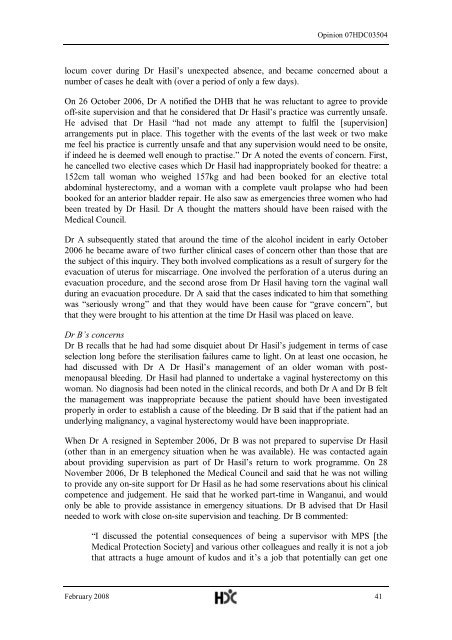Roman Hasil and the Whanganui DHB - Health and Disability ...
Roman Hasil and the Whanganui DHB - Health and Disability ...
Roman Hasil and the Whanganui DHB - Health and Disability ...
Create successful ePaper yourself
Turn your PDF publications into a flip-book with our unique Google optimized e-Paper software.
Opinion 07HDC03504<br />
locum cover during Dr <strong>Hasil</strong>’s unexpected absence, <strong>and</strong> became concerned about a<br />
number of cases he dealt with (over a period of only a few days).<br />
On 26 October 2006, Dr A notified <strong>the</strong> <strong>DHB</strong> that he was reluctant to agree to provide<br />
off-site supervision <strong>and</strong> that he considered that Dr <strong>Hasil</strong>’s practice was currently unsafe.<br />
He advised that Dr <strong>Hasil</strong> “had not made any attempt to fulfil <strong>the</strong> [supervision]<br />
arrangements put in place. This toge<strong>the</strong>r with <strong>the</strong> events of <strong>the</strong> last week or two make<br />
me feel his practice is currently unsafe <strong>and</strong> that any supervision would need to be onsite,<br />
if indeed he is deemed well enough to practise.” Dr A noted <strong>the</strong> events of concern. First,<br />
he cancelled two elective cases which Dr <strong>Hasil</strong> had inappropriately booked for <strong>the</strong>atre: a<br />
152cm tall woman who weighed 157kg <strong>and</strong> had been booked for an elective total<br />
abdominal hysterectomy, <strong>and</strong> a woman with a complete vault prolapse who had been<br />
booked for an anterior bladder repair. He also saw as emergencies three women who had<br />
been treated by Dr <strong>Hasil</strong>. Dr A thought <strong>the</strong> matters should have been raised with <strong>the</strong><br />
Medical Council.<br />
Dr A subsequently stated that around <strong>the</strong> time of <strong>the</strong> alcohol incident in early October<br />
2006 he became aware of two fur<strong>the</strong>r clinical cases of concern o<strong>the</strong>r than those that are<br />
<strong>the</strong> subject of this inquiry. They both involved complications as a result of surgery for <strong>the</strong><br />
evacuation of uterus for miscarriage. One involved <strong>the</strong> perforation of a uterus during an<br />
evacuation procedure, <strong>and</strong> <strong>the</strong> second arose from Dr <strong>Hasil</strong> having torn <strong>the</strong> vaginal wall<br />
during an evacuation procedure. Dr A said that <strong>the</strong> cases indicated to him that something<br />
was “seriously wrong” <strong>and</strong> that <strong>the</strong>y would have been cause for “grave concern”, but<br />
that <strong>the</strong>y were brought to his attention at <strong>the</strong> time Dr <strong>Hasil</strong> was placed on leave.<br />
Dr B’s concerns<br />
Dr B recalls that he had had some disquiet about Dr <strong>Hasil</strong>’s judgement in terms of case<br />
selection long before <strong>the</strong> sterilisation failures came to light. On at least one occasion, he<br />
had discussed with Dr A Dr <strong>Hasil</strong>’s management of an older woman with postmenopausal<br />
bleeding. Dr <strong>Hasil</strong> had planned to undertake a vaginal hysterectomy on this<br />
woman. No diagnosis had been noted in <strong>the</strong> clinical records, <strong>and</strong> both Dr A <strong>and</strong> Dr B felt<br />
<strong>the</strong> management was inappropriate because <strong>the</strong> patient should have been investigated<br />
properly in order to establish a cause of <strong>the</strong> bleeding. Dr B said that if <strong>the</strong> patient had an<br />
underlying malignancy, a vaginal hysterectomy would have been inappropriate.<br />
When Dr A resigned in September 2006, Dr B was not prepared to supervise Dr <strong>Hasil</strong><br />
(o<strong>the</strong>r than in an emergency situation when he was available). He was contacted again<br />
about providing supervision as part of Dr <strong>Hasil</strong>’s return to work programme. On 28<br />
November 2006, Dr B telephoned <strong>the</strong> Medical Council <strong>and</strong> said that he was not willing<br />
to provide any on-site support for Dr <strong>Hasil</strong> as he had some reservations about his clinical<br />
competence <strong>and</strong> judgement. He said that he worked part-time in Wanganui, <strong>and</strong> would<br />
only be able to provide assistance in emergency situations. Dr B advised that Dr <strong>Hasil</strong><br />
needed to work with close on-site supervision <strong>and</strong> teaching. Dr B commented:<br />
“I discussed <strong>the</strong> potential consequences of being a supervisor with MPS [<strong>the</strong><br />
Medical Protection Society] <strong>and</strong> various o<strong>the</strong>r colleagues <strong>and</strong> really it is not a job<br />
that attracts a huge amount of kudos <strong>and</strong> it’s a job that potentially can get one<br />
February 2008 41

















